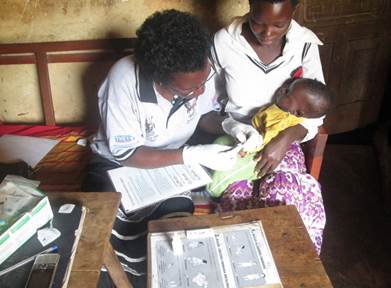New Book by Johns Hopkins Researchers Documents Community Health Worker Programs Across the Globe

Researchers at the Johns Hopkins Bloomberg School of Public Health released a new book on community health worker programs from around the world. The book, Health for the People: National Community Health Worker Programs from Afghanistan to Zimbabwe, provides a comprehensive, in-depth examination of available information about current national community health programs. It consists of case studies of 27 national community health worker programs, all detailed in the same format to allow for comparison of similar dimensions from program to program.
“This is the most complete, updated description of these programs currently available,” says Henry Perry MD, PhD, MPH, who led the project and is a senior scientist in the Department of International Health at the Bloomberg School. "The publication," he adds, "is notable due to the growing awareness of the important contributions that community health workers can make to improving the health of underserved populations throughout the world if they are properly trained and supported. This awareness has accelerated, as their valued and often heroic efforts as part of the COVID-19 response has gained worldwide attention."
Each case study has at least one author who has personal in-country experience with the program being described. The case studies provide insights into details of existing national CHW programs—their structure, their achievements, and the challenges they face. Each study also provides in-depth information on the historical context, health needs, health system structure, CHW program features, CHW scope of work, selection and training, support and supervision, incentives and remuneration, community role, linkages with the formal health system, program scale-up, monitoring and data use, financing, impact, and challenges.
“This has been a remarkable collaboration with program leaders and academics throughout the world and will be an important global health resource for the foreseeable future. The many contributions of Johns Hopkins faculty and students is notable and shows our commitment to strengthening and supporting primary health care around the world” says Perry. The case studies are from the following 27 countries: Afghanistan, Bangladesh, Brazil, Ethiopia, Ghana, Guatemala, India, Indonesia, Iran, Kenya, Liberia, Madagascar, Malawi, Mozambique, Myanmar, Nepal, Niger, Nigeria, Pakistan, Rwanda, Sierra Leone, South Africa, Tanzania, Thailand, Uganda, Zambia, and Zimbabwe.
National CHW programs are garnering increased attention, recognition, and scrutiny as an integral component of primary health care.1 Yet, despite the overwhelming evidence of the effectiveness of CHW programs, country investments in national CHW programs are only a small fraction of what is being spent on PHC more broadly. Although CHW programs have continued to expand, current information about national CHW programs is sparse and not easily accessed. As the momentum for building strong national CHW programs continues to grow, this book aims to serve as a useful resource that can contribute to the movement and contribute to Health for All as envisioned in the 1978 Declaration of Alma-Ata.
The 476-page book can be downloaded for free. It was developed with funding provided by the USAID Maternal and Child Survival Program and the Bill & Melinda Gates Foundation. The content does not necessarily reflect the views USAID, the United States Government, or the Bill & Melinda Gates Foundation.
The research team that contributed to the book includes the following individuals who are faculty, students, or graduates of the Bloomberg School of Public Health or the School of Medicine at the Johns Hopkins University:
| Adhikari, Binita. Research Associate, Department of International Health, Johns Hopkins Bloomberg School of Public Health |
| Brieger, William R. Professor, Department of International Health, Johns Hopkins Bloomberg School of Public Health |
| Chan, Elizabeth. University of Toronto Faculty of Law, Toronto, Canada |
| Chowdhury, Zaynah. Independent Consultant |
| Edward, Anbrasi. Associate Scientist, Department of International Health, Johns Hopkins Bloomberg School of Public Health |
| Gergen, Jessica. Visualst, Maputo, Mozambique |
| Glandon, Douglas. Associate, Department of International Health, Johns Hopkins Bloomberg School of Public Health |
| Hodgins, Steve. School of Public Health, University of Alberta, Edmonton, Canada |
| Javadi, Dena. Alliance for Health Policy and Systems Research, World Health Organization, Geneva, Switzerland |
| Joardar, Taufique. Multisectoral Nutrition Project/FHI 360, USAID, Dhaka, Bangladesh |
| Koffi, Alain K. Assistant Scientist, Department of International Health, Johns Hopkins Bloomberg School of Public Health |
| Mwinnyaa, George. Graduate Student, Department of Epidemiology, Johns Hopkins Bloomberg School of Public Health |
| Napier, Harriet. Program Manager, Community Case Management at Clinton Health Access Initiative, Inc. |
| Perry, Henry B. Senior Scientist, Department of International Health, Johns Hopkins Bloomberg School of Public Health |
| Pongpirul, Krit. Chulalongkorn University, Bangkok, Thailand |
| Scott, Kerry. Associate, Department of International Health, Johns Hopkins Bloomberg School of Public Health |
| Shelley, Katharine D. PATH, Seattle, WA, USA |
| Strodel, Rachel J., Medical Student, School of Medicine, Johns Hopkins University, Baltimore, MD, USA |
| Teklu, Alula. MERQ Consultancy PLC, Addis Ababa, Ethiopia |
| Zulliger, Rose. President’s Malaria Initiative, US Centers for Disease Control and Prevention, Maputo, Mozambique |
1. Schneider H, Okello D, Lehmann U. The global pendulum swing towards community health workers in low- and middle-income countries: a scoping review of trends, geographical distribution and programmatic orientations, 2005 to 2014. Human resources for health 2016; 14(1): 65.
